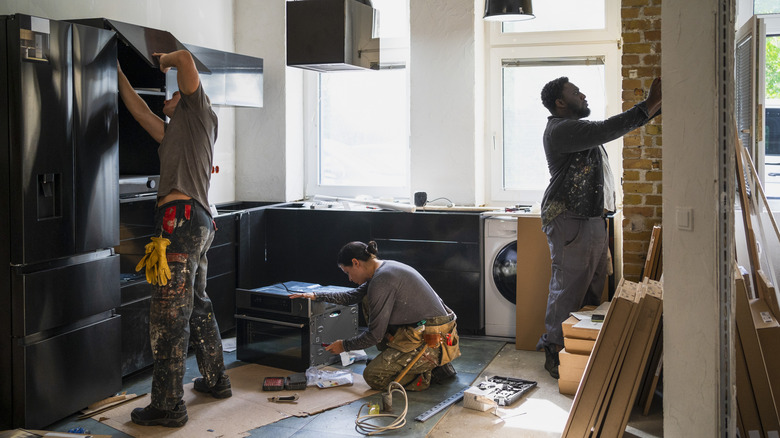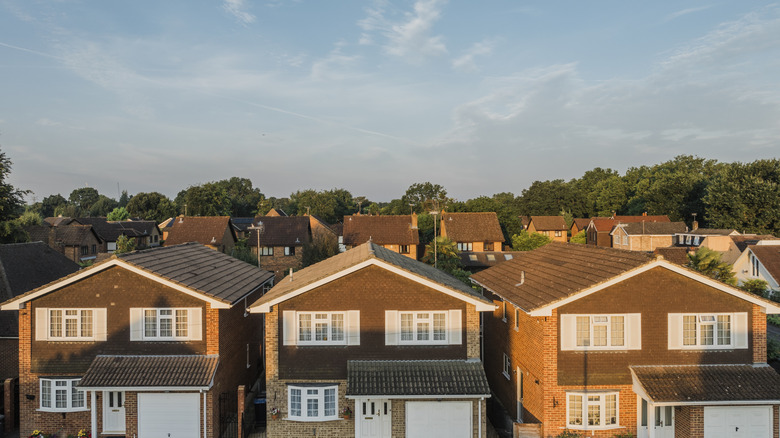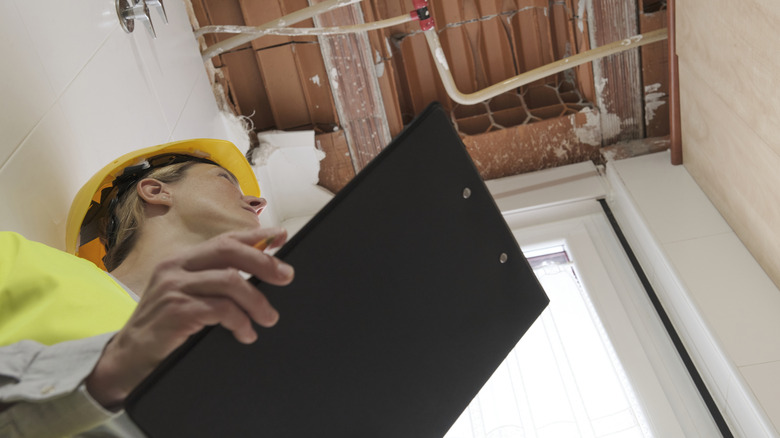How To Budget And Fund A Home Renovation: Everything You Need To Know
Renovating your home is both an exciting and daunting prospect. On the one hand, it means improving the aesthetics and function of your home — potentially even increasing your home's value with the upgrades — and on the other hand, renovation projects can be confusing, costly, and time-consuming. That's why we've created this home budget guide; it will walk you through the process of creating a renovation budget from beginning to end. It can also help you avoid common mishaps that renovating homeowners sometimes fall for.
Whether you're figuring out how much money a DIY can save you, determining how to hire contractors in your area, or wanting to know exactly how you can recoup your renovation costs by improving the value of your home, we'll help you prepare for renovations large and small. Let's get into it.
Decide on your renovation priorities
The best way to begin your renovation budget is by deciding which parts of your renovation are most important to you. Chances are you've got more than one thing in your house you want renovated, so list them out in order of priority, and start looking at the approximate cost for each one.
This will give you an idea of what your starting budget should look like. You don't need to save up the entire cost of a whole-house renovation at once; starting with the items that need urgent fixes will help you get more enjoyment out of your home, while you focus on saving for the rest of your renovations. It's also a good idea to tack related projects onto one another when possible. For example, if you really want to get your kitchen countertops replaced at the same time your cabinets are being painted, link these items together in your priority list and determine how much they'll cost together.
If you do decide to complete a renovation all at once, discussing your priorities is still a good idea. If worse comes to worst and you end up needing to cut a few renovation projects to save money, you'll already know exactly which renovations to cut (and how much money you'll save by doing so).
Research renovation costs yourself first
Reaching out to a contractor isn't the only way you can get an idea of how much your renovation needs will cost. You should first look online to get a ballpark amount of how much you might need to spend. This will not only give you a good idea of what your budget should be, but it can also help you when negotiating with contractors or understanding the specific costs of your home projects. Knowledge is power!
You can start by searching up each individual renovation cost and finding the highest and lowest estimates. Add them together to get a general range of what your total budget should look like. You can also check local neighborhood forums or reach out to others living in your area to get a sense of how much contractors are charging near you.
If you really want to dig in deep (always a good idea when budgeting for a reno), try searching for some materials you like in your area. Visit the website of a home materials shop, enter your location, and search for items that are similar to what you want — think cabinetry hardware, tiles, countertops, vanities, or light fixtures. This will give you local prices that can help you build expectations around what materials are feasible for you to purchase during your renovation.
Consult professionals for a better idea of your budget
After you've done some online research, it's time for you to reach out to the professionals. It's difficult to totally understand everything that goes into a home renovation — regardless of whether you're planning on DIYing some things or letting the professionals handle all of it, it's still a good idea to get a consultation. This will help you hone down a more specific budget.
Some professionals may be willing to provide a general quote for free; compare these quotes to your own research to see where your budget needs to be adjusted. Once that's done, you should also consider hiring a contractor for a consultation. This can be useful if you want to know more details about the cost of the materials you want to use. It can also help you understand how the specific layout of your home might change your renovation costs. They are the experts, after all.
Save room in the budget for unexpected surprises
If you've ever watched an HGTV remodel show, you know that something almost always goes wrong during a renovation — pipes burst, mold is discovered, there are signs of a termite infestation, or building codes aren't up to par. While much of this can be chalked up to a little dramatization (no shade here, we love to see it), a lot of these problems are very real issues that renovators everywhere have to deal with — often unexpectedly.
Not-so-fun surprises can pop up anywhere during your renovation. It might be something small, like the price of your chosen materials being more expensive than planned, or renovations taking longer than expected. There could be bigger issues, too, possibly with electrical or plumbing. With a home renovation, anything is possible; that's why it's recommended to put aside an emergency pot of money that's at least 10% of your overall budget. In fact, 10% is considered the absolute minimum — for a more effective safety net, 20% is a good amount.
If you don't end up using the extra money, consider it a bonus. You can return it to your savings account or use it on another small renovation instead. Maybe you snag some extra furniture, complete an additional paint job, or even do a mini update for a small space — like a half bathroom — depending on how much you have saved. Whether you end up under budget with room to spend or need to tap into your safety net, you'll be glad you saved a little extra.
Determine what you can actually DIY
DIYing parts of your home renovation is a fantastic way to save money. However, if you DIY a little too close to the sun, you could end up needing to pay double — once for the materials to do it yourself, and again to fix it (or have a professional come in).
A few beginner-friendly DIYs include things like painting your walls, changing out the fixtures on your cabinetry, replacing light fixtures, and swapping out faucets. If you're more experienced, you might decide to try installing your own kitchen backsplash or even redoing your shower tiles — these aren't simple tasks, but they're certainly possible if you know what you're doing.
DIY renovations to avoid (if you're not experienced, that is) generally include anything electric- or plumbing-related. In most cases, you can probably also leave countertop installation and flooring to the professionals. There are some cases where you might be able to accomplish these things yourself, but if you're already unsure of whether you can do it, it's not worth the risk.
Consider the value of your home post-renovation
A major reason behind most renovations is that they raise the value of your home, so that it's worth more when you sell it down the line. It's always smart to balance out the renovations you're doing just for you with renovations that add significant value to your house. For example, even with knowing paint colors can affect your home's resale value, you might decide to paint a few rooms an unmarketable color — but that's an easy thing to improve before selling. But you might also consider the fact that updating your flooring and finishing your basement will help you increase the list price of your home later on.
Generally, a few ideas that can upgrade the value of your home include kitchen and bathroom renovations, smart technology, finishing incomplete spaces, adding square footage where possible, and landscaping. Warm climates often put a lot of value into a deck or even solar panels, while colder climates may benefit from updated insulation or fireplaces.
Always take into consideration how long you plan to be in your home before you sell it. If your main goal is to increase your home's value, but you aren't planning on selling for another 10 years, then try to avoid home trends that could become outdated and focus on updates that will have long-term value.
Don't forget to research for your area
The area you live in can have a lot of influence over your renovations. Not only will it change the price you pay for materials and contractors, but even aspects like the building codes you'll need to follow will vary from place to place. Make sure you're up-to-date on these things so you understand how feasible your renovations are.
You should also look into your neighborhood to see if there are any other renovated homes that have sold recently, and how much they went for. Be sure to compare the listing price to what it actually sold for, and then check out other non-renovated sales in the area to see how you might benefit from the renovations you're planning.
Some renovations will also depend entirely on the area you're in. For example, adding or renovating a pool will be a major home upgrade in California, but if you're struggling with cold winters in Minnesota, a pool can actually make buyers uninterested in your home. Always take your neighborhood into consideration before undergoing major renovations.
Bring your budget in line with your home's current value
So, you're busy considering your neighborhood before you begin home renovations — don't forget that when it comes time to sell the home, potential buyers will be doing the exact same thing. One thing that homeowners don't always think about is that your neighborhood could cause your home to cap out at a certain value, and no amount of renovations will make your home sell above a certain list price. For example, if your house is positioned in a currently affordable neighborhood, buyers who are looking for a home in that area won't be interested in a listing that's extremely overpriced — so you'll likely have to sell at a loss. Be careful that you don't fall into the trap of giving your home an excessive amount of renovations that make it incomparable to other listings in your area.
Generally speaking, it's recommended that your renovation costs stay under 30% of your home's value, because it's unlikely that your remodel projects will be able to raise your home's value more than that. Remember that a major part of renovating is getting your money back later on when you sell the house — not dumping tons of money into a house with a list price that stays the same no matter what.
Always talk to multiple contractors before you hire
Consulting multiple contractors can give you a better deal if you're planning on hiring a professional. The goal of doing this is to find the contractor who is the best fit for you. It's true that consulting multiple professionals is a great way to ensure the person you hire won't overcharge you, but talking with a variety of contractors isn't just about accepting a bid from the cheapest one. Also consider how much experience they have, the time the renovation will take them, how receptive they are to what you want to do, and what they're able to complete within your budget.
Don't forget to also compare line items when possible. Make sure contractors aren't putting a large markup on raw materials or overcharging for certain steps of the renovation. Finding a contractor who is able to get a good deal on materials, or has ideas for how you can renovate your space more effectively, can be incredibly useful.
Consider the hidden costs
There are a lot of hidden costs to renovating your home that you might not think of ahead of time — and they may not be included in your renovation estimate, either. For example, is there anything you're doing that might require you to move out for some amount of time? Things like allowing a freshly painted room to air out, redoing flooring, or briefly losing access to power or water might mean you're more comfortable elsewhere. This could mean that you'll need to add a hotel stay to your budget.
If you need to move your own furniture out of the way for professionals, you might need to hire extra help in order to do so. Or if you have a lot of trash you need to get rid of during the remodel, you'll need to rent a dumpster or junk removal service. In many cases, professionals will take care of these aspects, but you should always ask ahead of time to make sure they have it covered (and if there are extra fees for this work). If you're DIYing much of the renovation yourself, add to your budget to cover all of these factors.
A pre-renovation home inspection could be a smart move
Older homes, especially, can have unforeseen issues that can seriously increase renovation costs. Hidden leaks, roofing issues, minor home foundation problems, or possibly even mold in some cases can be found midway through a renovation, which will cause costs to rise significantly. Getting an inspection done before beginning renovations can give you some peace of mind that nothing truly nasty will arise during the renovation and break the budget.
If you think an inspection might be worthwhile, you should add it to your budget and make sure it's completed well before renovations begin. This way, if any issues are found during the inspection, you can rework your renovation budget and your priorities based on what the inspection finds.
Set a timeline for saving up for your renovation
After you have your budget figured out, it's time to determine when you want your renovation to begin. This will give you a monthly (or weekly, if you want to break it down further) savings goal that you can use to fund your renovations. Let's say you want to do a renovation project six months from now, and the full project will cost $3,000. Simply divide the cost of your renovations by the number of months you have until they begin; in this scenario, you'd need to save $500 a month to start renovations in six months, or $125 a week. Be realistic with the amount of money you're able to save monthly for renovations — it's better to push your renovation date goal out a bit further, rather than go into debt.
You can also break down your timeline more if you're planning on separating out your renovation projects. For example, you might decide to save for a few months in order to get your fixtures updated, but wait for at least a year to save for a larger-scale bathroom renovation. While it's of course best to avoid going into debt, there are always options for a loan to cover part of the costs.
A HELOC can be useful for large renovations, but consider the downsides
Did you know that you can borrow money from your home's equity to fund your renovation via a HELOC (Home Equity Line of Credit)? This is how some major home renovations are funded. If your home's value is going to increase significantly from the renovations, you could consider opting for a HELOC to help fund your remodel. Since a HELOC is an actual line of credit, you can borrow as little as you want, and will only need to pay interest back on the amount you spend. However, keep in mind that — since you're literally taking out money against your own home — a HELOC runs the risk of causing your home to go into foreclosure if you aren't able to make monthly payments in the longterm.
The biggest benefit of a HELOC is simply that it can offer low interest rates, so if you're confident that you'll be able to keep up on the payments, it's considered by some to be an overall cheaper option than a personal loan. However, interest rates are variable, so paying a HELOC back quickly will give you the most savings. If you already struggle with debt or aren't completely confident that you'll be able to pay back the HELOC relatively quickly, it's not worth putting your biggest asset (your home) at risk. Always speak to a financial advisor before taking on a HELOC, so you understand every pro and con.
Consider other home improvement loans carefully
If you're still looking into other financing options for your home remodel, a personal loan might be worth checking out. It's good for small-scale renovations, and it doesn't rely on your home's equity — it's also typically a fast financing option, and you can take out a personal loan in as little as a day. However, you'll still need to be able to make regular payments and have a plan for paying back the entirety of the loan, or else you'll just be taking on unnecessary debt. No home remodel is worth the risk of accruing personal debt you can't pay off.
Another potential option would be a home equity loan, rather than a HELOC, which gives you a lump sum instead of a line of credit. They often have low, fixed interest rates. However, receiving a lump sum means that you'll have to repay (with interest) the entire amount, rather than just taking out money as you need it. A home equity loan also still places your home at risk; it will be foreclosed on if you're not able to pay back the loan.
Consult a financial advisor before making any decisions on home improvement loans. While they can be an advantage for some people, if your home remodels aren't urgent, you're probably better off saving for your home renovations instead. Never take on a loan you don't know you can handle.














